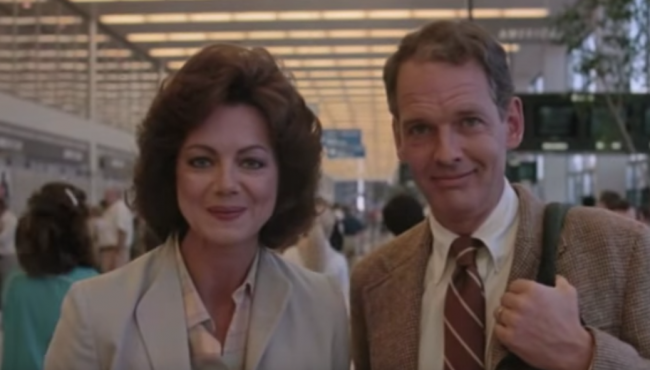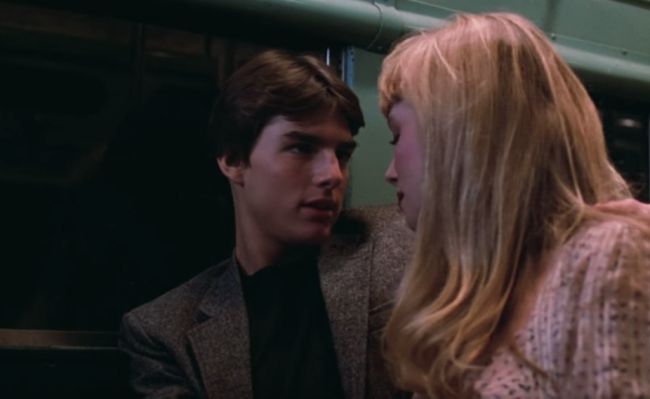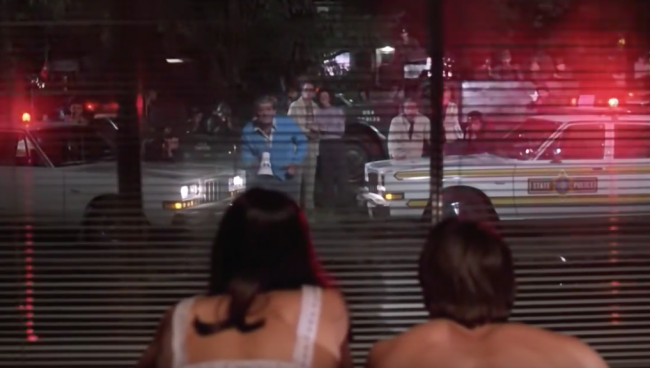Rewatching ‘Risky Business’: Unleashing the Power of What The F*ck

Risky Business is a 1983 comedy/drama about a Chicago teenager who is looking for fun at home while his parents are away, but the situation quickly gets out of hand.
It’s hard to really to understand the greater value of Risky Business, now 33 years since release, especially considering the significant career its star has had in the decades after, certainly overshadowing the film’s own success. However, imagine if this were the only film Tom Cruise ever made, which admittedly seems more than a stretch when giving even a passing glance at his good work here. He’d probably still be as popular now, deified like James Dean. Risky Business is an important film, and in taking a closer look, it’s clear why. Let’s rewatch.
The film opens on a train, or so it is meant to appear, a camera panning along a Chicago neighborhood at night while familiar clacking on tracks echoes underneath. It slowly morphs into the tantalizing electronic pings of a Tangerine Dream score, then cuts to Joel Goodson (Cruise) in a startling closeup, eyes shaded by thick black Ray-Ban Wayfarers and a lit cigarette in his mouth. He tells us “the dream is always the same,” that of him riding his bike home from high school but instead of home turns into a neighbor’s house where he goes inside, finding it empty until making his way upstairs to the bathroom where a beautiful girl (Francine Locke) is showering, visible through a misting glass door. She invites him to join her, so he agrees, but moving across the room and through the door, he loses her in the fog before suddenly finding himself in a room full of students taking their College Boards. He’s three hours late and only has a few minutes left. He’ll never make it. He’ll never go to college. His life is ruined. See what sex will do to you?

No doubt, as you read that, you were picturing every savory moment of that opening. This is really one of the all-time greats in fact, a start that establishes much of what we’re about to get in this comedy that is also a scathing satire and visceral look into the pressures of youth in America at the time. By all accounts, Risky Business, even with its name, sounds like a routine teen sex comedy, and in the hands of probably anyone else, would have been, lost to oblivion among the countless lot of raunchy nudie flicks of the era (and there were many). Fortunately, the hands it fell to were those of Paul Brickman, who both wrote and directed. He choose to do something a little different with the usual premise, and think how monumental that task must have been considering the ingredients of this story: horny high school boys, sexy prostitutes, parents out of town, and a Porche.

In fact, that opening dispels just about every expectation we might have going in, that tracking shot along the night skyline more like the first frames of a Michael Mann movie than one about teenage sexual awakenings. It sets a tone that stays always present, thanks to exceptional direction and musical cues that constantly remind us that while the description says we’re in a comedy, it is much, much more.
RELATED: 7 Things Great About Michael Mann‘s Thriller Collateral
A lot of that has to do with Brickman’s sensational writing. The economy of his dialogue is the first of much that makes it sting so sharp but it’s also elevated by its ever-so-slight wink at the audience, always inviting us into the tale. That’s made even more possible by the film’s brilliant fourth wall breaks. These aren’t the typical turn to the camera, give a snarky smirk, and comment, à la Ferris Bueller, but subtle moments that feel organic, ones that don’t make it a point to say, “Hey, we know this is a movie and you’re watching from out there” but rather, “you’re here with us and here’s something you should know.” Joel every so often glances our way and draws us in. In fact, it’s how the movie starts. But it’s not just Joel. Notice the moment when Joel’s parents are about to board a plane, leaving Joel alone for the first time. They stare right into the camera and tell Joel (and by extension us) to use his best judgement. It’s a sage piece of advice that we yield with trepidation the rest of the way.

This is long before the internet or smartphones dominated the landscape, so it’s not cluttered by the technology, instead, stripped rather bare so personalities are all that’s left. And there are some good ones. Right after that opening, we zero in on Joel and his few friends in the basement, and since this is highbrow satire, they are playing poker, smoking stogies and drinking beer, none of which is explained because none of it needs to be. What it says without a single word about it, is that these are boys on the cusp, eager to be men but not quite sure how yet, which is made doubly moreso as their conversation becomes clear. Sex. We learn that Joel had an opportunity to have some with a girl the night before, but hesitated and failed to take the jump, something the guys poke some fun at, even though we’re pretty sure there’s not a one in the lot that’s come even close to getting sex. Except Miles Darby, played by the incomparable Curtis Armstrong.

And here is where the film’s true theme emerges, in another brilliant moment. Outside, as the others are offscreen, awaiting in a car for Miles, he and Joel have a talk as Joel walks his bike. You know the scene. Joel confesses that he didn’t take the chance with the girl because he’s afraid to ruin his future. He’s not as secure as Miles, both mentally and academically, and so lives his life, as we’ve already seen, in fear. Miles breaks down his philosophy around three deceptively simple words: What the f*ck. He says: What the f*ck gives you freedom; freedom brings opportunity; opportunity … makes your future.
What’s happened is that Miles just laid out the entire movie. In thirteen words, he described the entire plot and shaped the next 90 minutes of screentime. Joel is, of course, slow to embrace this thinking, but once he does, these words define his every action after, as he finds the courage to phone a call girl, which leads to a bit of chaos, and then or course, to Lana (Rebecca De Mornay), the beautiful prostitute with a heart of gold that transforms Joel’s life.

The importance of Miles’ words resonates throughout, that his three-word mantra might sound, as Joel reminds, easy to say, but in practice means, as the movie’s title suggests, taking risks. Joel falls fast for Lana, and she, we find out, is under the thumb of her pimp Guido (Joe Pantoliano), who robs Joel’s house. This is the first consequence of what ‘what the f*ck’ brings, one that does offer new opportunity, in that of raising a huge amount of cash with Lana’s friends to buy back from Guido everything he’s stolen. That they do it with sex, well, that’s crucial, as it flips everything Joel was about when it came to sex. He daydreamed about, had chances for it, but never came through, and yet now, in the end, is in control of it.
I like the the humor in Risky Business. There are well-earned laughs here that comes from the humanity of it rather than setup and stings. Take the babysitter scene, a moment that has all the markings again of a teen sex comedy that Brickman once more veers off the tracks. Joel, shown in bed, shirtless, his hand inching under the sheets as he begins to masturbate, cuts to his imagination, laying the babysitter (Anne Lockhart) on the kitchen table. While it could haven’t gotten sexy, instead, in a moment that echoes John Hughes, it sees Joel’s parents suddenly appear outside with a S.W.A.T. team captain and a bullhorn: “Get off the babysitter.” Joel is so wracked by guilt and fear, he can’t even enjoy a little private time without ruining his future. I love that scene.

Interestingly, speaking of John Hughes and Ferris Bueller, I like too how Risky Business influenced that film’s famous car moment, where Cameron (Alan Ruck) sees his father’s prized Ferrari destroyed in the name of their own day of ‘What the f*ck’. In this film, it is Joel’s father’s Porche, and it too is destroyed when Joel and Lana have a moment of truth near a river. This scene, which is horrifying to Joel, is of course, to us, very funny, his life spiralling out of control, we believing, as movies do, it will all come around fine.

Through it all is Cruise, who sells us on Joel from the start, the character’s remarkable metamorphosis always convincing with Cruise behind the wheel. Take the famous dancing moment, a scene that I hardly need to describe, it being easily one of the top ten most memorable cinematic moments ever filmed, that of Joel, alone for the first night after his parents have left taking to removing his pants and gyrating about the house in his tighty whities and a pink dress shirt. This moment of release is really the crack in the keystone as it were, where Joel’s freedom unleashes the pent up reservoir, allowing him to take the chances he needs to in order to break from his fear. Nothing about this moment is not well thought out, from the lack of pants, symbolic of sexual awakening and extroversion, to the desecration of his mother’s sofa, where he flails about with orgasmic determination. Old time Rock & Roll is founded on rebellion, and that’s what he’s sowing now.

Don’t forget that this moment actually starts with Joel sitting at the dinner table with a tall glass of whisky and a shot of Coke along with a frozen TV dinner. Literally. Frozen. This is itself symbolic, the drink to break the rules and the dinner to show that he’s not even capable yet to take care of himself. This is the meditation of youth the film is teetering on all the way through, the imbalance of life in these few short years where it all seems out of reach. The dance is Joel giving in to Miles. What the f*ck.
Risky Business is a universally acclaimed film, one that broke molds and made an international star out of Cruise. It is the anti-teen sex comedy, a voice really for that generation, looking for identity. It’s also touching, romantic, disarmingly affecting, and honest. Do yourself a favor and watch it again.
